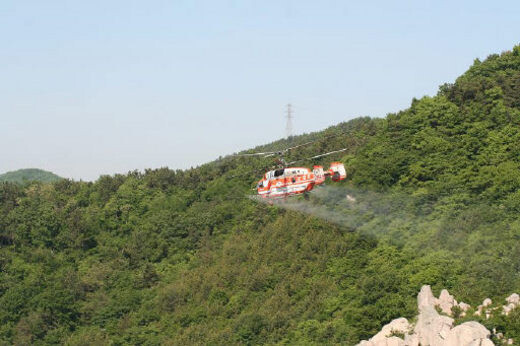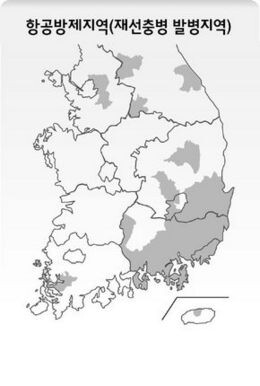hankyoreh
Links to other country sites 다른 나라 사이트 링크
Citizens, environmental groups concerned over spraying

A bee farmer in Ulsan, North Gyeongsang Province, is greatly anxious from May to June every year. At this time of year, the forestry authorities spray insecticide in the nearby mountains using helicopters. The goal is to kill Monochamus alternatus, a vehicle for pine wilt disease. "When the amount of collected honey is decreasing due to abnormal weather conditions, the authorities spray insecticide during the period when honey bees are most active," lamented the bee farmer.
Ahn, a 65-year-old resident of the village, does not go out when the helicopters are spraying chemicals. In July last year, Ahn collapsed due to headaches and dizziness because she was exposed to agricultural chemicals sprayed from the air while working on a field.
Many question the effectiveness of spraying chemicals from the air. Authorities say there are no alternatives to prevent the spread of pine wilt disease. Environmental organizations and farmers, however, are urging the government to take other measures, saying that spraying chemicals from the air causes other damage.

Forestry officials have been spraying insecticide to kill Monochamus alternatus from May to June every year since the pine wilt disease was first found on Mt. Geumjeong in Dongnae, Busan, in 1988. This year, as well, authorities have sprayed chemicals over an area of 17,045 hectares in 47 out of 61 cities and districts across the nation where the disease has occurred. The entire program will cost over 5.5 billion won (US$5,914) and there are plans to spray the chemicals another two to four times this year. The area where the disease occurred is about 7,877 hectares but the area over which insecticide has been sprayed is two times larger than this.
Environmental groups and farmers have raised questions because, despite the preventive measures, areas damaged by the pine wilt are getting larger. The disease happened over 72 hectares of forest land in 1988, but over 1,677 hectares in 2000 and on 7,800 hectares in 2005. The affected area has thus increased more than 100 times over what it was 20 years ago.
Lee Seong-geun, an activist from the Korean Federation for Environmental Movement [sic], maintained, "The victimized areas continue to increase despite the spraying of the chemicals from the air. This means the measure is not effective."
In response, Dr. Lee Sang-myeong of the Korea Forest Research Institute said, "As it is difficult to spray insecticide in every nook and corner, it is actually hard to completely exterminate the disease. However, we can see losses certainly are on the decrease...Unless we spray the chemicals from the air, the damage will become more serious."
At first, the related authorities used Fenitrothion to eliminate Monochamus alternatus, but due to a controversy over its harmfulness to other animals and plants, they changed to Thiacloprid since 2005.
Dr. Lee said, "The effect of the two chemicals is almost same, but Thiacloprid, while almost twice as expensive, doesn’t affect animals and destroys only Monochamus alternatus."
But environmentalists said that ‘there is no such thing as harmless insecticides.’ No matter how low their toxicity, they said, if exposed multiple times to the chemicals, fruits as well as useful insects will be affected by them.
Environmental groups said that the government and citizens should objectively verify the effect of the spraying of insecticide from helicopters. In addition, they urged the government to depend on environment-friendly methods, such as using a natural enemy of Monochamus alternatus, if possible.
Yoon Seok, an official of an environmental group in Ulsan, said, "It is like burning a thatched cottage while attempting to catch a flea. As North Jeolla Province in April chose a way to control the disease from the ground after considering advantages and disadvantages of spraying insecticide from the air, it is time to stop irrational dependence on the old way of preventing the disease."
Please direct questions or comments to [englishhani@hani.co.kr]
Editorial・opinion
![[Column] Season 2 of special prosecutor probe may be coming to Korea soon [Column] Season 2 of special prosecutor probe may be coming to Korea soon](https://flexible.img.hani.co.kr/flexible/normal/500/300/imgdb/original/2024/0426/3317141030699447.jpg) [Column] Season 2 of special prosecutor probe may be coming to Korea soon
[Column] Season 2 of special prosecutor probe may be coming to Korea soon![[Column] Park Geun-hye déjà vu in Yoon Suk-yeol [Column] Park Geun-hye déjà vu in Yoon Suk-yeol](https://flexible.img.hani.co.kr/flexible/normal/500/300/imgdb/original/2024/0424/651713945113788.jpg) [Column] Park Geun-hye déjà vu in Yoon Suk-yeol
[Column] Park Geun-hye déjà vu in Yoon Suk-yeol- [Editorial] New weight of N. Korea’s nuclear threats makes dialogue all the more urgent
- [Guest essay] The real reason Korea’s new right wants to dub Rhee a founding father
- [Column] ‘Choson’: Is it time we start referring to N. Korea in its own terms?
- [Editorial] Japan’s rewriting of history with Korea has gone too far
- [Column] The president’s questionable capacity for dialogue
- [Column] Are chaebol firms just pizza pies for families to divvy up as they please?
- [Column] Has Korea, too, crossed the Rubicon on China?
- [Correspondent’s column] In Japan’s alliance with US, echoes of its past alliances with UK
Most viewed articles
- 1After election rout, Yoon’s left with 3 choices for dealing with the opposition
- 2Why Kim Jong-un is scrapping the term ‘Day of the Sun’ and toning down fanfare for predecessors
- 3Two factors that’ll decide if Korea’s economy keeps on its upward trend
- 4Noting shared ‘values,’ Korea hints at passport-free travel with Japan
- 5AI is catching up with humans at a ‘shocking’ rate
- 646% of cases of violence against women in Korea perpetrated by intimate partner, study finds
- 7Why Korea shouldn’t welcome Japan’s newly beefed up defense cooperation with US
- 8‘We must say no’: Seoul defense chief on Korean, USFK involvement in hypothetical Taiwan crisis
- 9[Column] Season 2 of special prosecutor probe may be coming to Korea soon
- 10Fast Food Workers’ Day comes to South Korea